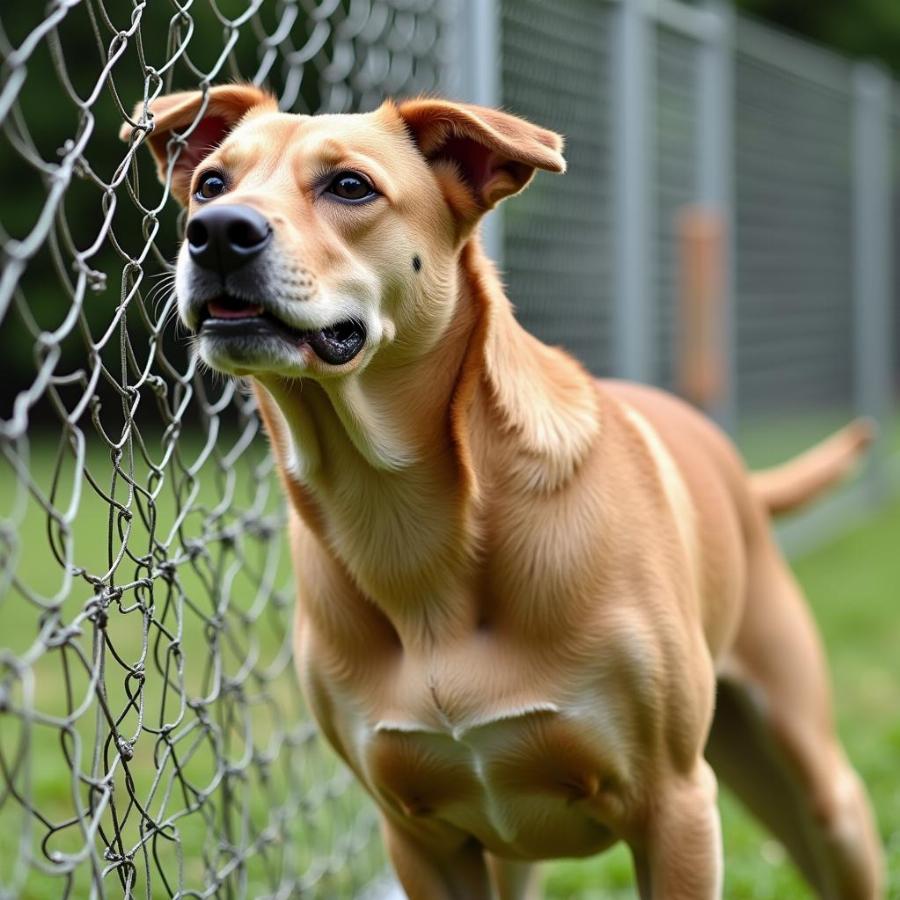Chicken wire is a popular and readily available material often considered for dog fencing. But is it truly the right choice for containing your canine companion? This guide explores the pros and cons of using chicken wire for a dog fence, offering valuable insights into its effectiveness, safety, and alternatives to ensure your furry friend stays safe and secure.
Is Chicken Wire a Suitable Dog Fence Material?
Chicken wire, while economical and easy to install, presents some significant limitations as a dog fence material. While it might be sufficient for containing small, docile dogs, it is generally not recommended for larger breeds or dogs with a strong prey drive. Its lightweight construction makes it susceptible to damage from determined dogs who can push through, climb over, or even chew through the wire.  Dog pushing through a weak chicken wire fence
Dog pushing through a weak chicken wire fence
Chicken Wire Dog Fence: Pros and Cons
Understanding the advantages and disadvantages of using chicken wire for dog fencing is crucial in making an informed decision. Let’s examine both sides:
Pros:
- Cost-effective: Chicken wire is generally cheaper than other fencing options.
- Easy installation: It’s relatively simple to install, requiring minimal tools and expertise.
- Visibility: Chicken wire provides good visibility, allowing you to keep an eye on your dog and its surroundings.
Cons:
- Not Durable: It’s easily damaged by chewing, climbing, and pushing.
- Safety Concerns: Sharp edges can pose a risk of injury to your dog.
- Ineffective for large or determined dogs: Larger or more determined breeds can easily break through chicken wire.
- Short lifespan: Chicken wire is susceptible to rust and deterioration, requiring frequent replacement.
Alternatives to Chicken Wire Dog Fencing
Considering the drawbacks of chicken wire, exploring alternative fencing options is essential for your dog’s safety and your peace of mind. Sturdier materials like welded wire, chain link, or wooden fences offer better security and longevity. For smaller dogs, dog run panels can offer a secure and adaptable containment solution.
What to Consider When Choosing a Dog Fence
Choosing the right dog fence involves several factors:
- Dog’s Size and Temperament: A larger, more energetic dog will require a more robust fence than a smaller, more docile breed.
- Yard Size and Layout: The size and shape of your yard will dictate the type and length of fencing required.
- Budget: Fencing materials vary significantly in price, so consider your budget when making a decision.
- Local Regulations: Check for any local ordinances regarding fence height and materials.
How to Reinforce a Chicken Wire Fence (Temporary Solution)
If you’re using chicken wire as a temporary solution, reinforcing it can improve its effectiveness. Adding wooden posts for support and layering the chicken wire can increase its strength. However, keep in mind this is not a long-term solution. You can learn more about fence breaks by reading about how to find break in dog fence. If you’re dealing with a particularly determined digger, consider burying chicken wire along the fence line to deter escaping under the fence.
Is a Chicken Wire Fence Safe for My Dog?
While cost-effective, a chicken wire fence may not be the safest option. The sharp edges can cause injuries, and the weak structure can lead to escapes, putting your dog at risk. If you’re concerned about fence security, you might find our article on dog ear wood fence insightful.
What Gauge Chicken Wire is Best for a Dog Fence?
Even with reinforcement, chicken wire isn’t ideal. If you must use it, choose a heavier gauge, but recognize it’s still a temporary fix. A more robust dog fence mesh is a safer long-term solution.
How High Should a Chicken Wire Dog Fence Be?
The height depends on your dog’s size and jumping ability. Even a tall chicken wire fence is easily climbed, so consider safer alternatives like those mentioned earlier. For more on yard containment, see our guide on the yard dog.
Conclusion
While chicken wire may seem like a budget-friendly option for dog fencing, its inherent weaknesses make it unsuitable for most dogs. Prioritizing your dog’s safety and security necessitates exploring more robust and reliable fencing solutions. Investing in a stronger fence will provide peace of mind knowing your furry companion is safe and contained within your yard.
FAQ
- Can I use chicken wire for a small dog? While possible for very small, non-jumping breeds, it’s generally not recommended due to safety concerns and potential escape risks.
- Is chicken wire strong enough for a German Shepherd? Absolutely not. Chicken wire is inadequate for containing large, strong breeds like German Shepherds.
- What is the cheapest dog fence option? Chicken wire is often the cheapest, but its low durability makes it a poor long-term investment.
- How do I prevent my dog from digging under a chicken wire fence? Burying chicken wire or landscape fabric along the fence line can deter digging.
- What is the best dog fence for a jumper? Tall, solid fences made of wood, vinyl, or composite materials are best for jumpers.
Beaut Dogs is your trusted source for expert advice and comprehensive information on all things dog-related. We’re dedicated to helping you provide the best possible care for your canine companion. For personalized guidance on choosing the perfect dog fence or any other dog-related questions, please contact us via Email: [email protected]. Beaut Dogs is here to support you and your furry friend every step of the way.